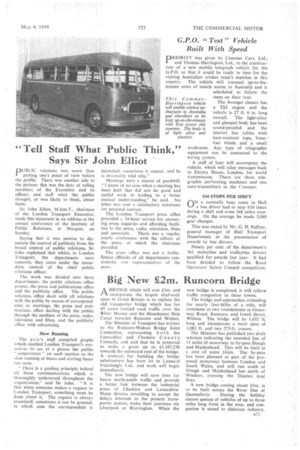"Tell Staff What Public Think," Says Sir John Elliot
Page 57

If you've noticed an error in this article please click here to report it so we can fix it.
UBLIC relations was more than I putting one's point of view before the public. There was another side to the picture: this was the duty of telling members of the Executive and its officers and staff what the public thought, or was likely to think, about them.
Sir John Elliot, M.Inst.T., chairman of the London Transport Executive, made this statement in an address at the annual conference of the Institute of Public Relations, at Margate, on Sunday.
Saying that it was unwise to dissociate the control of publicity from the broad control of public relations, Sir John explained that whilst, in London Transport, the departments were separate, they came under the immediate control of the chief public relations officer.
The work was divided into three departments: the public relations office proper, the press and publications office and the publicity office. The public relations• office dealt with all relations with the public by means of correspondence or meetings, the press and publications office dealing with the public through the medium of the press, radio, television and films, and the publicity office with advertising.
Slow Running The p.r.o.'s staff compiled graphs which enabled London Transport's executives to see at a glance the public " temperature" on such matters as the slow running of buses and starting buses too soon.
" There is a guiding principle behind all these communications which is thoroughly understood throughout the organization," said Sir John. "It is that when someone makes a request to London Transport, something must be done about it. The request is always examined; sometimes it can be granted, in which case the correspondent is informed; sometimes it cannot, and he is invariably told why."
Meetings were a source of goodwill. "I know of no case when a meeting has been held that did not do good and useful work in leading to a better mutual understanding," he said. No letter was ever a satisfactory substitute for personal contact.
The London Transport press office provided a 24-hour service for answering press inquiries and affording facilities to the press, radio, television, films and newsreels. There was a regular yearly conference with the editors of the press, at which the chairman presided.
The press office was not a buffer. Senior officials of all departments consistently saw representatives of the press.




































































































































